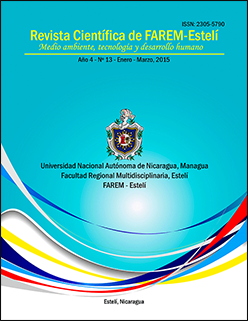Leading role of women during the pre- and post-revolutionary stage in the city of Esteli, Nicaragua
DOI:
https://doi.org/10.5377/farem.v0i13.2570Keywords:
women, knowledge, experience, leadership, transformation.Abstract
It is a qualitative study; the methodological strategy is the biographical method. Its overall objective is the reconstruction of the experiences of a woman to make visible the leading role of women, who contributed to the psychosocial development in their personal areas, family, community and social relevant historical moments in the city of Esteli. The Biographical Method, appropriate strategy to generate learning through systematization and reflection. To J. Pujadas (2000), the construction of memory, along with the forms of affirmation of individual identity, reflected in the autobiographies and other personal documents show a plurality of voices and sensibilities in the interpretation of social reality. The results demonstrate the belligerence of women in historical times, the social constraints that hinder their limelight in the psychosocial development of various environments. The facilitating elements lived as a country that encourage developmental opportunities and spaces for women to take on roles that transcend the traditionally assigned, perpetuated roles by social institutions such as family, school and religion.
Downloads
1170
Downloads
Published
How to Cite
Issue
Section
License
© Revista Científica de FAREM-Estelí

